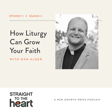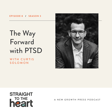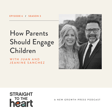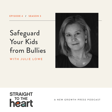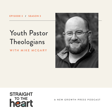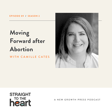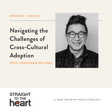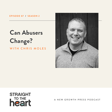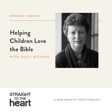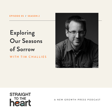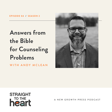Become a Creator today!Start creating today - Share your story with the world!
Start for free
00:00:00
00:00:01

Helping Hurting People with Brad Hambrick
Brad Hambrick and Rush talk about an exciting season of launching kids into the world, and hopefully into college baseball. And they also talk about counseling, the art and ministry of walking with people through hardship, and the beauty and freedom of real friends to whom we can entrust even our secrets.
BRAD HAMBRICK ONLINE
Brad's Website - Facebook - Twitter - Instagram
MENTIONED IN THIS EPISODE
Angry with God: An Honest Journey through Suffering and Betrayal
Mobilizing Church-Based Counseling: Models for Sustainable Church-Based Care
Learn more about the podcast here.
Transcript
The Haunting Nature of Secrets
00:00:00
Speaker
And if I could put a simple word on that, it would be secret. And here's the thing about secrets. They haunt. They're like a ghost. If you think back to whatever that first bad, bad thing is you did as kid and your parents didn't know it, and then after that, your parents say, we need to talk. You need to go, oh no, do they know? Or if they say, I love you, I'm proud of you.
00:00:30
Speaker
You think, if they knew.
Introducing 'Straight to the Heart'
00:00:34
Speaker
And that haunting, whether the secret is something I did wrong, sin, something that happened to me, suffering, secrets,
00:00:48
Speaker
I'm Rush Witt, and you're listening to Straight to the Heart, a podcast from New Growth Press. Each episode includes interesting talks with leading authors and thinkers. We hear who they are, what they think, how they approach their important work in ministry, and the moments and influences that change their lives.
Launching Kids and Real Friendships
00:01:06
Speaker
Today, I spent a helpful time with Brad Hambrick.
00:01:09
Speaker
who is pastor of counseling at the Summit Church in Durham, North Carolina. Brad and I talk about an exciting season of launching kids into the world and hopefully into college baseball. And we also talk about counseling, the art and ministry of walking with people through hardship and the beauty and freedom of real friends to whom we can entrust even our secrets.
00:01:34
Speaker
I'm better equipped to be that kind of friend and you can be too. This is Straight to the Heart. So what's going on in the Hamburg house this summer? Exciting plans, vacation, what's going on around your house?
00:01:51
Speaker
It is a busy summer. So we have our oldest who is headed off to college. And so there is all of the preparations that go into launching your first into independent living. And then our younger one loves the game of baseball. And it is like this summer and next summer are his two prime recruiting
00:02:21
Speaker
windows and college coaches and all of that kind of thing. You're starting to have those conversations, not in a anticipatory like, oh, wouldn't it be nice? But no, you're starting to hit what is a good fit. So there's lots of decisions and lots of transitions.
Pastoral Counseling Challenges
00:02:42
Speaker
So does he feel a lot of pressure?
00:02:44
Speaker
At this point, I would say he feels a lot of drive. I think he's doing decent at not feeling pressure. He knows what it takes to add the strength in the firing chain from the back leg through the delivery. And consistently he's putting in the work to do that. We've played with kids that are draftable prospects.
00:03:09
Speaker
And so he knows what a major league athlete looks like at this age. He recognizes that's not him. He would like the opportunity to compete at the highest level possible. And he's doing the things that would put himself in that position. But I also hear him talking about career aspirations and starting to put degrees that he's interested in ahead of
00:03:38
Speaker
other factors in choosing a college and as a parent.
00:03:44
Speaker
I love it that athletics are teaching excellence, work ethic, and drive. I do too. I don't want athletics determining direction in life. And so if I can see him tapping into that motivation structure, that he's learning what it takes to pursue excellence. That's a huge life skill. I don't want something that's
00:04:10
Speaker
whether it comes to an end at 18 or 22, that should not choose the direction of your
Church-Based Counseling
00:04:16
Speaker
life. Yeah, yeah. What's church life like now?
00:04:22
Speaker
Um, so I serve at a rather large church and large doesn't mean good. It just means big. Uh, and so the challenges that happen at various sizes, uh, there's some unique things that you face. Uh, but, uh, summit being a, a large church, there is, um, you know, there's always a lot going on. Uh, and in my role where I am,
00:04:52
Speaker
I'm the pastor of counseling, which means I'm the pastor of Code Red. At a church like ours, pastor of counseling doesn't mean pastor of friendship. It doesn't mean pastor of every helpful conversation. It means pastor of crises.
00:05:13
Speaker
And so, you know, with that, there's, you know, if we're a church of around 15,000, if you have 15,000 people, there's a large number of crises that you are walking with our pastoral staff as they seek to be faithful shepherd and holistic in the care that we provide. And so there's always those things that are at the forefront of life for me.
00:05:43
Speaker
And then from a ministry development standpoint, you know, we're doing this for new growth. We're starting a, you know, they're not starting, we've had a ministry called G4 and GCM that we've done here at the church and developed over the last 10 years. And those things are moving towards a replication phase. You know, replication is a high value of our church.
00:06:14
Speaker
that we call them plumb lines. They're just short pithy statements that represent core values for us. Show your work and let people replicate your work.
00:06:25
Speaker
that that's something that we value. And so the church-based counseling series that we're doing with new growth that will start this fall with mobilizing church-based counseling and then facilitating counseling groups, that when churches say we would like to have a counseling ministry,
00:06:46
Speaker
We want it to be more than friendship. I mean, we want to strengthen the friendship ministry of our church, but we're not wanting to go into that space that's professional or paraprofessional. It's intimidating to start thinking about intake forms and informed consent and case notes. We would love to do something counseling that's between that space.
00:07:11
Speaker
more than a friendship, less than professional or paraprofessional. How do we do that? That's the sphere that G4, GCM, everything that's coming out in this series is really meant to activate and mobilize in the life of churches. And I get excited about that.
00:07:32
Speaker
Yeah, I think that's so exciting and so important for churches to have helpful direction because as you're alluding to in what you just said, there are so many challenges and just trying to understand the best way forward.
00:07:49
Speaker
I think it'd be helpful to hear your thoughts on if a church is becoming more interested in counseling and they're really trying to even focus their discipleship in better and stronger ways, what comes to mind for you as the most important thing that they could be pursuing or they could be learning and growing in?
00:08:17
Speaker
What would you say is just it could be a starting point or it could be don't lose sight of this aspect of counseling and discipleship and try to become better at this because it will impact so many other areas of ministry altogether. What comes to mind for you?
00:08:40
Speaker
Yeah, so I'm from Kentucky. So I'm going to do that thing where I use a little Kentucky grammar, not because it's accurate, but because it communicates what it is I want to say. I'm sort of from Kentucky too. I was born in Bowling Green. So you'll understand what I say. Yeah, spend a lot of time there. I think one thing that happens when churches start thinking about a counseling ministry is they can get in the mindset that more formal equals more better.
00:09:05
Speaker
Again, I know more better is not the way to say it, but it kind of creates some symmetry in the phrase. I'm not against formality and counseling, but your question was, hey, when we really want to do a better job in our discipleship-oriented care, that's kind of the pre-formal. That's before you artificially pair a helper and a healthy
00:09:32
Speaker
That's before anybody's been trained to do something and there's role definition in that relationship The kinds of things that you can do to increase authenticity In the life of your membership where people really feel known cared for connected and
00:09:58
Speaker
that any church that has a variety of formal counseling ministries. One of the things that I'm trying to keep in the forefront of our staff is counseling will never replace shepherding. The long-term care
Dealing with Anger Towards God
00:10:17
Speaker
that somebody needs, whether we're talking about inside a church or outside a church, is going to happen
00:10:26
Speaker
in their friends and family's fears of relationship. And the idea that somehow we're gonna create this formal space of help that is good and does some uniquely good things that's going to replace the need for authenticity.
00:10:45
Speaker
for those natural relationships. And that's why there's in that series that we were just talking about, the church-based counseling series. The third book that comes out in that series, so two come out this fall, one in the spring, is called Transformative Friendships. And what I'm trying to do with that one is it's a culture-shaping book. It's not a program. It's not something that a church launches. But when people go, man,
00:11:16
Speaker
I just feel relationally anemic in a culture where we don't connect well, where like that depth of relationship doesn't get very deep. And if that, how do we do that better? Because that's going to be the lifeblood of
00:11:41
Speaker
people feeling cared for in the church. The acute care of a counseling ministry can be wonderful, but the ongoing care of those natural relationships is if people are going to be satisfied in a church, that's going to make the biggest difference.
00:12:05
Speaker
Okay, let's be honest. No one gets mad at God for something small. When we're angry with God, it's because we face something immensely hard. Anger is an often overlooked part of grieving, and as such, is an appropriate response to profoundly painful events.
00:12:22
Speaker
While we often are prone to interpret our anger
Fluctuating Church Relationships
00:12:25
Speaker
about intense suffering as being at God, this book is an invitation to process these intense emotions with God as our source of comfort, who is sturdy enough to support these turbulent emotions.
00:12:40
Speaker
Angry with God by Brad Hambrick patiently walks you through the process of being honest with God and others about your pain. You'll learn how to articulate your pain, alleviate the effects of this pain, contextualize your experience in light of the gospel, and begin to hope again. Angry with God is full of practical, accessible, and concise guidance for your struggle with deep grief that's accompanied with anger and confusion.
00:13:09
Speaker
It's also part of the Ask the Christian Counselor series by New Growth Press, which walks readers through their deepest and most profound questions. And Angry with God gives readers the tools to understand their struggle with anger and grief and how the gospel brings hope and healing. Visit newgrowthpress.com to learn more about Angry with God and Honest Journey Through Suffering and Betrayal by Brad Hambrick.
00:13:40
Speaker
Yeah, I wonder what you said a second ago, something to the effect of involving the congregation, let's say, or the community, the members of the church in developing more fruitful relationships together. And I can see in my own church, my own life,
00:14:02
Speaker
And in other churches, I mean, it's not hard to see. It's normal that those relationships tend to go up and down. The temperature of that kind of culture in a church can go up and down at various times. And so I wonder, what do you see as one of the biggest challenges that tends to bring it down in a church? And what is the biggest, maybe most helpful kind of
00:14:31
Speaker
correction or adjustment to help it come back up, to try to eliminate a little bit of that up and down so much. I mean, we're talking about a family of Christians in a church together. There are lots of points at which we interact, and there's opportunity for trouble and conflict, and that's part of it going up and down. What do you think are maybe the biggest challenge that brings it down, and what's the biggest adjustment to help it come back up again?
00:15:01
Speaker
This may be slightly autobiographical in that just season of life. But we were just talking about our children and as they're going to college and getting different interests, that season of life impacts who you're around.
00:15:25
Speaker
that when you go from single to young Mary, to young kids, to elementary school age kids, to multiple kids, to kids developing interest, at the level of the adult, that's gonna impact who you're around. And it can very quickly, and I don't use this word in the heavy sense, but it can very quickly become an excuse.
00:15:55
Speaker
that who I'm around is going to change based on what's going on. It's just not worth investing in these relationships in this season. What would be an example?
00:16:09
Speaker
when we go through the summer and right now we're more involved with our younger son and being involved in the baseball circles and that's got us around and we're around one group of people. And that in the fall, it'll be a different thing and that's a different group of people. And so you're just, you're in different circles.
00:16:33
Speaker
And you don't assume that the people that you're seeing frequently right now are the people you're going to see frequently three months from now.
Impact of Deep Friendships
00:16:41
Speaker
And so having some people that you're intentional with that, like, you know, back in the day when we were dating, we called it a DTR, define the relationship that I think we need to have that kind of intentionality in our friendships.
00:17:00
Speaker
And then it's one thing to define it. And this is a little bit of previewing what will be in that friendship book, is we just need some basic questions. Like sometimes we want the relationship to go meaningfully deeper. But we don't know where the line is between where we are now and sharing my deepest darkest secret. And it feels like a chasm.
00:17:27
Speaker
What does it look like to have questions that just hit the variety of areas of life? And then some degrees on the thermometer. Where it's like, ah, this is what it's like to let that go a little deeper, a little deeper, a little deeper. So we're not fast forwarding something in a way that becomes relationally awkward. But there's a plan.
00:17:49
Speaker
that those relationships that I have realized, these are relationships that if we invest in it, they have a strong probability of being tenured. And these are the kinds of questions that don't feel weird, that don't feel wonky, that we could cultivate that. You know, because when you look at secular studies on the effectiveness of counsel,
00:18:15
Speaker
and they try to numerically gauge the effectiveness of counseling as best you can. The number one factor that determines success in counseling, again, as it can be measured, is the quality of resources somebody has outside of counseling. And the depth of friendships is one of the leading factors in that. So on the pie chart, that resources outside of counseling is 40%.
The Introvert's Social Dynamics
00:18:45
Speaker
And so you can create a counseling ministry, but if you don't have these depth of relationships outside of that counseling ministry, you're handicapping yourself on how effective that's going to be. A church is a unique environment where we can do intentional things on both ends of the sphere.
00:19:08
Speaker
I'm just sort of inserting this or kind of tagging it onto what you were saying. There's just something important about developing with the use of tools like that a genuine interest in other people. And that doesn't come naturally to everyone. I think that's a that's a big part of what we mean when we when we say things about being an introvert or an extrovert of the genuine interest of I would like to know about you. I don't know that I am a big
00:19:39
Speaker
I don't know that I'm heavily extroverted because there are a lot of times where I find myself kind of subdued or reserved in situations and I'm more kind of backing up in a relationship or a conversation. But there is always this kind of, like I love conversations like this.
00:19:58
Speaker
I love to be able to ask questions. I love to hear the answers. I love to be asked questions. So, I mean, I guess that's kind of extroverted, but that doesn't come naturally to everyone. What about in your personal life? Are you more introverted or extroverted? And how has this, you know, obviously you have an interest in people as a biblical counselor, you have to. That's what you're doing.
00:20:23
Speaker
Is that something that comes easy for you, something you've grown in, there are challenges there? Yeah, when we come to personality and skill set and that kind of thing, I am heavily weighted to being an introvert. And I think one of the implications of that is I prefer one on one conversations.
00:20:52
Speaker
much more than I do group conversations. Now from an aptitude standpoint, I think I'm decent at public speaking.
00:21:02
Speaker
And so if you give me a microphone and a crowd and a little time to prepare, I feel like I can talk to a group. I'm not real inhibited about that kind of thing. I don't think I have a preacher voice. I just kind of talk about the subject of what needs to be said. I do one-on-one. I feel like I do that well, like my natural giftings kind of fit. Where I struggle is one-on-group. When the conversation is just kind of randomly bouncing around,
00:21:33
Speaker
I'm never clear when it's my turn. And I like to think about what I'm going to say. And so by the time I have formulated what it is that I want to say, the conversation has left me behind. So I either have to take the conversation back to where it was that I started formulating my thought, or I start all over of figuring out what it is that I want to say about what it is we're talking now,
00:21:59
Speaker
And then I get left behind again.
Counseling and Unique Individuals
00:22:01
Speaker
Yes. I can just recognize like in those bouncy informal conversations, I'm not against them. I'm just not good at them. Yeah.
00:22:11
Speaker
And I really admire people who are, they just surf a conversation like a person on the ocean surfing a wave and they are fully in the moment and how engaged they are. It's a great picture. Now they probably put their foot in their mouth a little more than I do because they're free and extemporaneous, but those are
00:22:37
Speaker
you know, some of that's dispositional. Some of that is aptitude. Some of that is values of, you know, I probably wrestle in some of the same ways that you described, but more from a prideful bent than a fear of man bent. Like, my words mean a lot to me. I want to stand behind my words. And so that same
00:23:05
Speaker
processing it, same behavior, very comparable social dynamic, different motive. And for counseling, this is part of what I enjoy about counseling, is getting to know the uniqueness of this person in front of me and not assuming one behavior or one social dynamic has one explanation.
Comfort with Discomfort in Counseling
00:23:32
Speaker
But what is it that for this person in their environments accounting for what's going on, how do we begin to bring hope and direction to that? Do you feel like that experience holds people back in churches from being more likely to
00:23:50
Speaker
extend themselves as a helper to someone else, whether it's in a counseling related way or a discipleship kind of way. Because if just like the average person, which we are, are struggling with what we're talking about, it seems to me like that would make it so much more difficult.
00:24:10
Speaker
to be willing to get into something beyond just a surfing conversation. When the stakes feel high, there's some kind of problem that needs to be addressed. If I feel like I'm not able to collect my thoughts, then I would tend to steer clear
00:24:36
Speaker
Yeah, so several thoughts are hitting me here as we're talking about this one. Again, I know what I'm about to say is hyperbole overstatement, but when I'm working with counseling interns, one of the things that I frequently say is the number one skill of counseling is being comfortable, being uncomfortable. That when you walk into a hardship of somebody else's life, it's an uncomfortable situation.
00:25:04
Speaker
if I'm uncomfortable being uncomfortable, I'm going to be preoccupied with me. And so just accepting that when we get meaningfully involved in each other's life, it's gonna be uncomfortable. And I need to be okay with that. Now, another thing that I frequently say on the backside of that, if you don't know what to say, ask more questions.
00:25:31
Speaker
a genuine, curious question, trying to get to know someone and their situation better, you rarely hurt or offend somebody with a question. It's our statements. And so if you're at that spot and you're not sure, like, what is it that would be helpful to say, don't say anything, ask, like just explore, get to know. And so,
00:26:01
Speaker
Oftentimes, as Christians, as those who want to counsel with the Bible, we get hung up on the answer part of counseling, and we miss the value of just the relational side of exploring with somebody, getting to know them.
00:26:24
Speaker
Oftentimes what we feel like is stalling because we don't know the answer is received as the other person is caring because you want to know me and you're not oversimplifying this thing. You know, the other part, it goes back to what we were saying earlier. What role are you in that friendships aren't really answer relationships. Um, when answers emerge in friendships, that's bonus.
00:26:53
Speaker
That's gravy. That's icing on the cake. I don't know what metaphor somebody likes that it's right. It's the main benefit of counseling. I'm sorry. The main benefit of friendship is I don't have to be alone with this. I don't have to be embarrassed by this. Um, I can verbally process this with you that there is value in being supportive.
00:27:21
Speaker
even when I'm not sure what directive would look like.
Promoting Brad's Book on Counseling
00:27:26
Speaker
And I think so often when we're talking about our church-based relationships, it is that pressure to have an answer, to give a directive, to make it better that rushes us to devalue the impact of lovingly being with someone in a hard time.
00:27:54
Speaker
As we've been talking about counseling in the local church, I've been reminded about Brad Hambrick's new book coming out October 16, 2023, called Mobilizing Church-Based Counseling. It's about models for sustaining church-based care.
00:28:11
Speaker
Mobilizing Church-Based Counseling is the first book in the Church-Based Counseling series and provides a framework for guiding churches through the process of building a volunteer-led counseling ministry. Many churches would like to start a counseling ministry, but they don't know where to start. Mobilizing Church-Based Counseling offers direction to churches for creating a ministry built around lay-led counseling groups and mentoring,
00:28:39
Speaker
Based on proven models used in his own congregation, Brad Hamburg lays out a clear plan to launch a sustainable soul care ministry that can be replicated in churches of any size, even your church. This first book in the church-based counseling series is designed to help churches mobilize.
00:28:58
Speaker
and utilize levels of care from friendship to mentoring to counseling groups. Visit NewGrowthPress.com today to learn more about mobilizing church-based counseling by Brad Hambrick. And it's a beautiful thing when
00:29:19
Speaker
Someone is able to share the things, looking at their shoes, sharing what they're going through. And when they look up and they see you receiving that and thanking them and welcoming them, I think that it changes
00:29:36
Speaker
the entire anticipation or it answers the anticipation that most people have because i find that even even for people that have had a long history in you know local church and they have good friends and they have good pastors and.
00:29:51
Speaker
fellow church members, that there's still this sense that I don't know if I can say this because of what I'm going through because I'm going to shock somebody or it's going to be really off-putting to them.
00:30:07
Speaker
And I think the beautiful freedom that is given is when somebody can look up and realize I didn't scare you away. I didn't freak you out. I didn't surprise you. I didn't you know, I didn't disappoint you. You you were you were able to receive it. And actually, I think that's more common than the person sharing expects it to be. I think that it's more common for people
00:30:36
Speaker
to not be surprised at what you're getting ready to say. And it's such a barrier that has to come down in order for someone to be able to then have the freedom and say, well, you do understand. You will receive me. I've not ruined our relationship by sharing this difficulty that I have. It's really a beautiful thing. Yeah.
00:31:03
Speaker
So let's take that category for things I am intimidated to talk about. Things that I'm not sure it's socially okay to say. And if I could put a simple word on that, it would be secret. And here's the thing about secrets. They haunt. They're like a ghost.
00:31:27
Speaker
If you think back to whatever that first bad, bad thing is you did as kid and your parents didn't know it, and then after that, your parents say, we need to talk. You need to go, oh, no, do they know? Or if they say, I love you, I'm proud of you, you think, would they, if they knew,
00:31:48
Speaker
And that haunting, whether the secret is something I did wrong, sin, something that happened to me, suffering, secrets, haunt. And when we find that freedom that we share to somebody and their eyes meet ours with compassion, it's like the ghost got vanquished. I don't have to wonder, would you say that if you knew?
00:32:19
Speaker
And that there's no amount of understanding truth that's going to create the same experience as I told you, and you'd love to me. And to what you were saying, usually when somebody, if we think about it on the receiving end, on that kind of disclosure, what we see is courage.
00:32:49
Speaker
for the person sharing what they feel is fear. Courage and fear are two sides of the same coin. It's just whether you're the one sharing or receiving. But on that receiving end, like we go back to people who get inhibited, they're not sure what to say when somebody shares something heavy with them. Another great first thing to say, thank you,
00:33:18
Speaker
Thank you for trusting me with that. You change the dynamic of the room when this person knows I did a good thing by trusting you in this. So some personal questions.
00:33:36
Speaker
So there, you know, obviously listeners to a podcast like this who are already familiar with you, they would know more about you through books that you've written or they hear you speak somewhere, things like that.
00:33:51
Speaker
And so I have a couple of personal questions I'm interested in knowing the answers to. One of the things that we do in our church staff, when we have what's called, we have staff dinner every month, and we try to catch up in some ways that we aren't able to at other times through the month because of busyness. We do this a little bit in our family as well, maybe at dinner time. We ask for anybody who wants to share, what is a current blessing
00:34:19
Speaker
and a burden. What is something that is just a big blessing right now? It's bringing you so much happiness. And then what's something in your life that is just a struggle? I think, oddly, my answer is the same to both questions. Really? And so is it in a season of life where you can start to count the days for one child and months for the other than they are?
00:34:49
Speaker
moving towards independence and being out of the home, graduating, there's a real sense of satisfaction that right now they seem to have a sense of direction that would serve them well. And there are things that they are
00:35:06
Speaker
they're not leaving to leave, they're leaving to pursue. And so you look at that like, I like that. And people tell me I'm going to enjoy the emptiness season of life. And it's not that I think they're lying, I just don't believe them. Like, I feel like we're going to miss the boys when they're gone. And so when I'm like, ah, what is satisfying seeing them, you know, kind of like,
00:35:36
Speaker
It's in the first, second, third John, like I have no greater joy than seeing my children thrive, pursued, like do, like that. That's wonderful. At the same time, they're going and we'll miss them and there will be a whole recalibration to how my wife and I think through schedule and those kinds of things. So in this season, I think it's the same answer to both.
00:36:06
Speaker
I've really appreciated our time, Brad. It's been encouraging and helpful to me personally, and I'm sure it will be to anybody that listens to our conversation. So I'm really, really grateful for that.
00:36:20
Speaker
Yeah, I've always enjoyed our friendship. You and I have gotten to know each other over several years now. And just to have a conversation feels pretty normal between you and I. So I've enjoyed it as well as I've enjoyed other conversations. I'm good. Good. I'm happy for that.
00:36:42
Speaker
You've been listening to Straight to the Heart, a podcast from New Growth Press. Our next episode releases next week, and I look forward to seeing you there.
